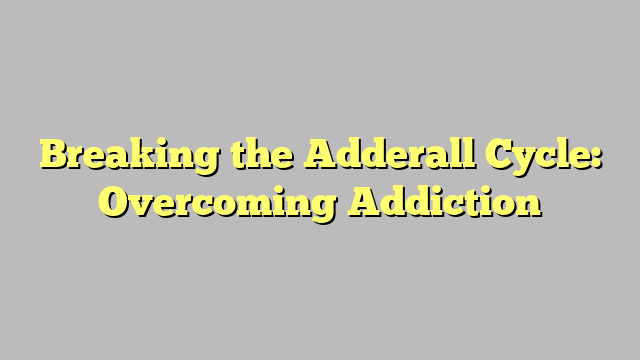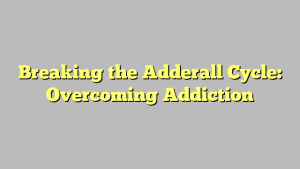Adderall addiction can be a challenging struggle for those caught in its grip. Whether it began as a means to enhance focus and productivity or to cope with other issues, the cycle of dependence can quickly take hold, leading to detrimental effects on both physical and mental health. Breaking free from this cycle requires strength, support, and a willingness to confront the root causes of addiction. It’s important to recognize the signs of addiction early on and seek help before the consequences escalate.
Recognizing the Signs
Adderall Addiction
Adderall addiction often starts subtly, with individuals taking the medication as prescribed but gradually increasing their doses without medical guidance. Over time, this can lead to physical and psychological dependence, with the person feeling unable to function without the drug. One common sign of adderall addiction is the presence of withdrawal symptoms when attempting to cut back or stop using the medication abruptly.
Individuals struggling with adderall addiction may experience changes in their behavior and mood. They may become increasingly secretive about their medication use, hiding pills or lying about their dosage. Additionally, they might exhibit erratic behavior such as mood swings, agitation, or hostility. These changes can have a significant impact on their relationships with friends, family, and coworkers.
Physical signs of adderall addiction can also manifest, including weight loss, insomnia, and changes in appetite. Some individuals may neglect their personal hygiene or exhibit tremors and muscle twitches due to the stimulant effects of the drug. It is crucial to pay attention to these physical indicators and seek help if you suspect that someone you know is struggling with adderall addiction.
Overcoming Withdrawal Symptoms
Withdrawal from Adderall can be challenging, both physically and emotionally. Common symptoms include fatigue, irritability, and increased appetite. It is important to remember that these feelings are temporary and part of the healing process.
Developing a routine that prioritizes self-care can help alleviate withdrawal symptoms. Eating nutritious meals, getting regular exercise, and practicing relaxation techniques such as deep breathing or meditation can support your body as it adjusts to being Adderall-free.
Seeking support from friends, family, or a therapist can also be beneficial during this time. Talking about your experiences and feelings can help you process and cope with the challenges of overcoming Adderall addiction. Remember, you are not alone in this journey towards recovery.
Seeking Professional Help
When it comes to overcoming adderall addiction, seeking professional help is crucial. This addiction can significantly impact one’s physical and mental well-being, making it important to reach out to healthcare providers or addiction specialists.
Professional support can come in various forms, such as counseling, therapy, or medication-assisted treatment. These professionals have the expertise to guide individuals through the recovery process, providing personalized strategies to address the underlying issues contributing to adderall addiction.
Through professional help, individuals struggling with adderall addiction can receive the necessary tools and support to break free from the cycle of addiction. It’s essential to remember that reaching out for help is a sign of strength and can lead to a successful recovery journey.
















